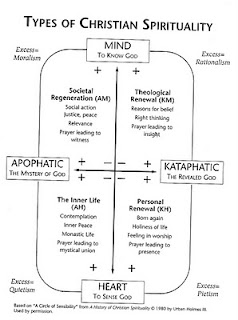View of Sin ...#2
Create in me a pure heart, O God, and renew a steadfast spirit within me. Do not cast me from your presence or take your Holy Spirit from me. Restore to me the joy of your salvation and grant me a willing spirit, to sustain me. Psalam 51:10ff
A pure heart emptied of self would seem to correlate to Christ being formed within you. Wilhoit is firm when he suggests that the only place such formation really takes place is in the honesty and hope of 'optimistic brokenness'
I have a theory growing that a process can be seen within Wilhoit's matrix, as an individual in faith matures, and discovers more of what it means to be selfless, the boxes reveal mile posts on what could be a significant journey.
Box 1 Sin Management.
- Focus is on external sin and that yearnings are fully met.
- People are characterised here through their expression of what they have done wrong, a strong emphasis being on sins of commission rather than omission.
- There is a strong tendency to think that such sin can be overcome through trying harder. Marked by striving and denial.
- Wilhoit points out that the Pharisees were 'adept sin managers'.
Box 2 Thoughtful self discipline.
- The internal nature of sin acknowledged.
- Sense of brokenness focuses on their sin and not as much on the yearnings from aches and disappointments in life.
- Recognize need to change from inside.
- Take their sin seriously and know they have a problem they can't fix on their own.
Box 3 Realistically trying.
- External focus on sin.
- The depth of sin has not yet hit them.
- Marked by 'great disappointment' / 'dark night of the soul' / hitting of a metaphorical wall
- 'discover that they are climbing a ladder leaning against the wrong wall'.
- This experience can be either blessed brokenness in which we turn to God or become cynical and self-protective.
- Cynicism here is common.
Box 4 Optimistic Brokenness.
- There is a willingness to see sin as grievous problem that cannot be simply willed away.
- With maturity there is a feeling of ill at ease with self discovery, alongside a deep optimism about the power of grace to set things right.
- Optimistic brokenness is hope.
- Psalm 51 offers what it is to recognise the brokenness within self combined with a rise of relief and optimism.
- Pride and self-protection diminish.
Wilhoit, J.C (2008:60ff) Spiritual Formation as if the Church Mattered. Baker


Comments